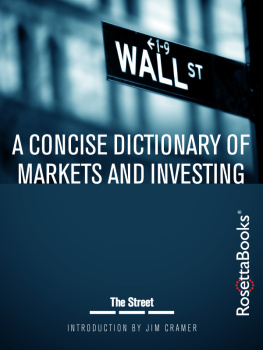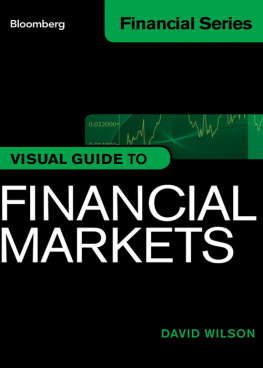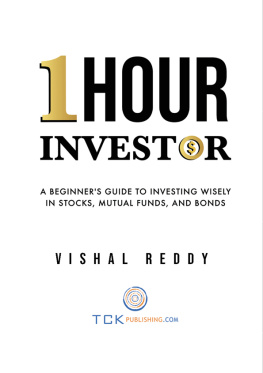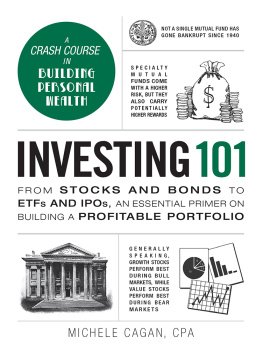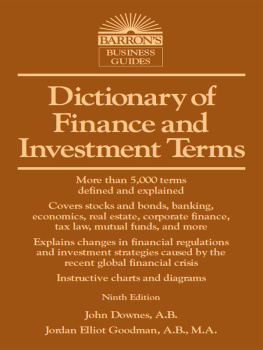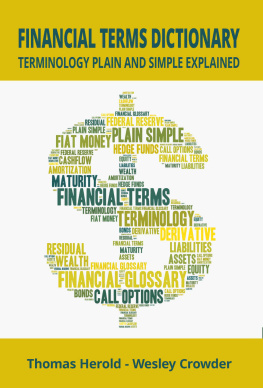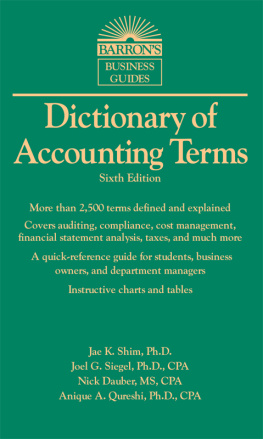Introduction
Words have power. No more so than in the world of finance. You are what you say and what you understand. The better you grasp the meaning of financial terms, the better you can communicate and the more transparent becomes the vast, exciting and potentially profitable world of money.
By the same token, words can obfuscate. They can fool smart people. Once formidable financial houses Lehman Brothers, Bear Stearns, Washington Mutual among them collapsed because investors misunderstood (or chose to ignore) the explosive risk hidden within packages of securities given such benign labels as Credit Default Swaps (CDSs) and Collateralized Debt Obligations (CDOs).
This dictionary is not meant to be comprehensive. It is meant to be useful and accessible. Its based on common usage as practiced by financial professionals and was compiled over more than a decade by editors of The Street. It was designed to help you strip away the layers of patina applied by the industry so you can see the real picture beneath. That word restoration can be fun.
For example, did you ever wonder why oil was measured in instead of gallons or tons? Turns out the first oil wells were drilled in Pennsylvania in the late 1850s, and the most readily available containers happened to be empty whisky barrels, which the thirsty roughnecks obligingly kept in plentiful supply.
And what about a means nothing more than municipal over bond.
And what about ? To be sure, there are as many definitions as there are funds. I should know. I ran a hedge fund for many years and know the complexities of the business. But my definition is quite simple:
It is a fund that can go long or short stocks, hence the hedge connotation. But its different from a regular fund in the way its managers are compensated. Regular money managers get a percentage of the assets. Hedge fund managers get a percentage of the assets and take 20% of the gains, both realized and unrealized.
So, while I know a thing or two about stocks and markets, I learned a ton from reading this little book. You can too.
So use it. Enjoy it. Keep it handy as protection.
Next time some tall-talking financial artist bombards you with words and terms he thinks you dont understand, tell him to raise his hands and spread his MOB.
You know better.
Jim Cramer, founder of TheStreet and host of Mad Money on CNBC.
Index
A
Actively Managed Funds
With actively managed funds, managers pick stocks or other securities with a certain goal in mind, like beating a particular index or achieving a certain level of return while assuming a certain level of risk. Because theres stock-picking going on, these funds tend to have higher expense ratios, and higher taxes, than passively managed funds.
Agency Securities
Agency securities are bonds and notes issued by government-sponsored enterprises, or GSEs, including Fannie Mae, Freddie Mac and the Federal Home Loan Bank. They are the highest-quality debt instruments after Treasury securities.
Dont confuse agency securities with mortgage-backed securities, some of which are issued by the same entities. Agency securities are a variety of spread product and are evaluated as such.
Alpha
Alpha tells you how a fund is actually doing compared to its beta (a volatility measure that is supposed to give you some sense of how far the fund will fall if the market takes a dive and how high the fund will rise if the bull starts to climb). If the beta is 1.5, and the fund rises 15% more than the market, then the alpha is zero.
Annuity
An annuity is a retirement vehicle sold by insurance companies that provides the benefits of tax deferral and protects your principal. It sounds really great, and in some respects it is. But the costs of annuities can be exceptionally high so high that annuities often make poor investments.
Arbitrage
The practice of simultaneously purchasing and selling securities in two separate financial markets in order to profit from price differences between them. For example, an arbitrageur would buy a security at one price on the . Arbs also get busy in mergers and acquisitions (M&A), mostly by shorting the stock of companies making an acquisition and simultaneously buying shares in the takeover target.
Usually the price disparity is seemingly insignificant and normally would be consumed by transaction costs, so most arbitrage is done by big financial institutions, which have low transaction costs and can move huge volumes.
The arbs depend on computers. When all the arbs move in the same direction, the overall market can go haywire.
Ask (Price)
The ask is the price the seller is (surprise) asking for his or her stock at what price he or she wants to sell it. The bid is, you guessed correctly, the price a buyer bids for the stock, or how much the buyer is willing to pay for it.
Asset-Backed Security
Asset-backed securities, or ABS, are bonds created from various types of consumer debt.
When consumers borrow money whether by taking out a home-equity or auto loan, or by running a balance on a credit card their loans become assets on the books of the entity that extended the credit a bank, an auto finance company or a consumer finance company.
The assets may be sold to a trust a corporation that exists only on paper, and whose sole purpose is to issue bonds backed by the assets it contains asset-backed securities. If, for example, your car loan has been securitized, your payments on the loan flow through the trust to the investors in the asset-backed securities issued by the trust.
The main types of asset-backed securities are home-equity loans, credit-card receivables, auto loans, mobile home loans and student loans. Asset-backed securities are purchased primarily by institutional investors, including corporate bond mutual funds. They are a variety of spread product and are evaluated as such.
B
Back-End Load
A load (fee) paid when you redeem your shares of a fund. Most funds drop the load if you hold for a specified period of time, usually several years.
Backlog
Backlog includes any order a supplier may have on its books, even if product is scheduled to be shipped a year in advance. Its in contrast to futures orders, which cover a specified time period.
Barrels Per Day
When oil was discovered in Titusville, Pa., in 1859, it was loaded into the only large containers available whiskey barrels. Over the years the industry standard came to be the 42-gallon barrel, which is still the standard paper measurement for pricing and pumping purposes, although oil rarely sees the inside of a barrel anymore. But in an odd forecasting of todays equipment shortage, the first shortage in Titusvilles 1859 oil boom was barrels in which to store oil.
Basic Earnings
Earnings per share calculated as net income divided by the number of common shares. The number of common shares outstanding is usually easy to find in an income statement. Diluted earnings, however, are thought to be a better overall measure than basic earnings.
Basis Points
A basis point is a hundredth of a percentage point, or 0.01% a key concept in discussing bond yields. The term is used mainly when quantifying changes in yields, or the difference in yield between two bonds.
For example, say that a bonds price drops, causing its yield to rise from 6% to 6.10%. One would say its yield rose by 10 basis points.
Another example: Say one bond has a yield of 6.5% and another has a yield of 6.75%. The difference can be expressed as 25 basis points.
Beige Book
The Federal Reserves Beige Book report summarizes anecdotal information collected by the District Federal Reserve Banks from key businessmen, economists, market experts and other sources. Used at the meetings of the Federal Open Market Committee (the Feds monetary policymaking arm).
Next page
